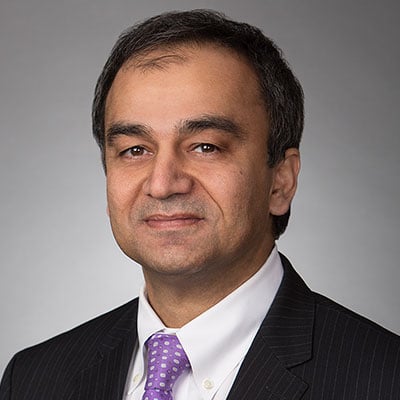Big Law Is Investing in Infrastructural Bill Expertise Amid High Business Demand
Partner Rohit Chaudhry is quoted in this article from The American Lawyer discussing how law firms are adapting to an increase in demand for infrastructure-related transactional work under the Biden administration.
Law firms are adding lateral partners, organizing marketing pushes and information sessions for clients and coordinating task forces.
As the Biden administration attempts to plot a path for its infrastructure proposals, several law firms, such as Kirkland & Ellis, Akin Gump Strauss Hauer & Feld and Arnold & Porter Kaye Scholer, among others, are reporting a sharp uptick in demand for related transactional work, litigation, regulatory, lobbying and policy and a host of other practices.
New business for firms started even before President Joe Biden’s inauguration. But as infrastructure policy and other regulations make their way through Congress and government agencies, the volume of work, they say, may only accelerate over the next few years—a potential business bonanza for Big Law for years to come, especially if lawmakers approve any legislation.
But firms have had to invest to get the business. They are organizing marketing pushes and information sessions for clients, coordinating cross-practice task forces and adding lateral partners.
At Kirkland, in the last six months alone, the firm has added eight more lateral partners focused on infrastructure, with a view to the work that will come in the next few years, said Rohit Chaudhry, a partner in Kirkland & Ellis’ infrastructure practice in D.C.
“Clients want help deciphering and decoding the Biden infrastructure bill, and its impact on current and proposed projects,” he said, adding the bill “will be a remarkable boost to a wide variety of infrastructure sectors because the bill is so broad in its scope and coverage.”
He said Kirkland webinars on infrastructure bill guidance have been some of the firm’s most popular in recent months, and there has been an uptick in inquiries from current and prospective clients. “Infrastructure and energy are considerable investments, and clients don’t make those investments for the short term,” Chaudhry said. “These are long-term plays which require considerable attention from their law firms.”
One particular area of focus for the firm’s plans is renewable energy and sustainability.
“We’ve seen a lot of activity, both in M&A and financing across all the renewable sectors, including solar and wind. But there is also an emerging class of energy transition projects such as battery storage, which are starting to scale up,” Chaudhry said.
Law firms have had to switch gears and deal with “very distinct differences between the previous administration and the new administration,” said Greg Louer, managing director of Arnold & Porter’s legislative practice who leads a lobbying team. “Now, you have a very different—expansive—view of what constitutes infrastructure. We are not just looking at this as roads, tunnels and bridges. … Instead, you’re talking about technologies that were not previously contemplated as worthy of investment from the previous administration’s perspective.”
These include electrification technology, broadband infrastructure deployment and a new focus on water. As a result, more client industries beyond transportation and heavy construction are looking for business opportunities that will arise.
Lawyers in the field say to meet this demand they have had to pivot resources toward understanding the implications of the bill and implementing cross-practice task forces with sector expertise, transactional expertise and government advocacy.
Infrastructure and environmental considerations also now go hand in hand. Ethan Shenkman, a partner in Arnold & Porter’s environmental practice group who was deputy general counsel of the EPA during the Obama administration, said his phone started “ringing off the hook” after the election was settled and then calls continued to accelerate after the Biden administration issued its first few executive orders on climate change and infrastructure.
Indeed, many client sectors now have an interest to learn about their business opportunities. Susan Lent, a partner at Akin Gump in Washington, D.C., said transportation industry clients are contacting the firm, as well as institutional investment clients, hedge funds and private equity funds that are looking for help on assessing opportunities within the new landscape.
Lent’s practice traverses transportation, energy and environment, regulation, litigation, federal funding and public law and policy.
She said since the beginning of the year she has seen a “huge uptick in client development and a lot more interest from clients and prospects wanting to hear about what they should be doing, what opportunities there are—how we can monitor what’s going on and then take advantage of opportunities once legislation is enacted.”
She said her past month’s focus has been on helping clients advocate for provisions in upcoming infrastructure legislation and understanding the implications of bills that have and will be introduced.
And a new congressional rule bringing back earmarks—which direct funding to a specific project in a district—has brought with it a flood of work from clients looking to understand and secure funding for infrastructure projects, Lent said.
With the White House’s post-pandemic rebuilding efforts covering so many areas of industry, client needs in lobbying touch on “many practice areas” beyond infrastructure: “Lobbying on energy, corporate tax, health care, security, innovation and supply chain, just to name a few,” said Arshi Siddiqui, a policy partner at Akin Gump.
Some clients are looking for Akin Gump to provide them with insight into how the bill will eventually evolve—and what opportunities and risks will arise, she said. A second group of clients wants to influence decision-making in the Beltway on specific issues that will impact their business model.
“Infrastructure policy and the broader effort to modernize the economy won’t be a straight line from point A to point B,” says Siddiqui. “There will be twists and turns, which is why clients need a firm that understands Washington, to decipher what’s real and advise on how to move forward.”

